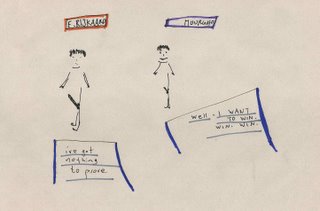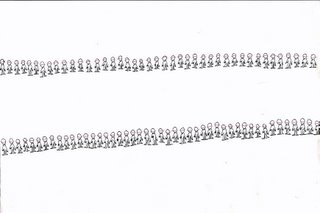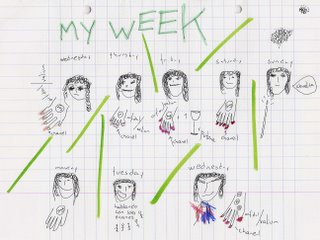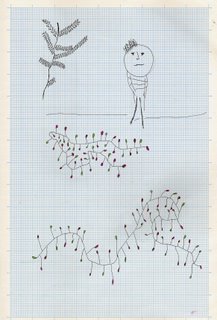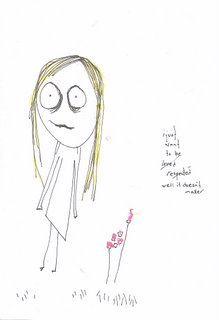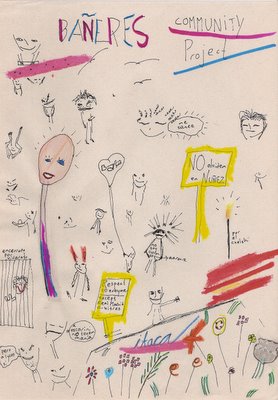artversussport
This blog will be dedicated to the beautiful passions of life: Food, Film, Football (Barça), Philosophy, Literature, Art and Humanity.
Tuesday, February 21, 2006
Wednesday, February 15, 2006
Incident
This incident occurred in the midst of the World Chess Championship;
A young girl on an exchange in the States, the family where she stayed with was well to be, travelled, even if they admitted - knew little of the island in the north of the Atlantic. After a few days, they asked her if her father was a fisherman, (not such a strange question bearing the percentage of the population having that occupation) the young girl was not shy and liked to express herself in English, answered: No, no, my dad prefers Spassky.
Monday, February 13, 2006
Bus Journey, 1972.
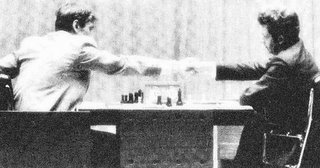
Bus Driver
Lady 1
Lady 2
Young man
Young boy
Older friend
Bus
A bus is on its way from the west end of town, through the center, stopping by Laugardalur and to the outskirt of town. It is the so called number four route.
By the sea, a few stops into the journey, a woman comes on the bus, she is carrying a handbag, which hangs loosely, one could even argue nonchalantly on the shoulder and a carrier bag of what one can presume, of fodd. She sits down on the fourth row, there are many empty seats, but she chooses the one next to another lady.
No one is talking, although after a couple of stops, a conversations starts. A gentleman has gotten on the bus and sits down behind them, he seems like a young gentleman and is eading a book, by Halldor Laxness a book about old and new times. Apart from that the bus is empty, it is still early hours on a Saturday, the weather is not bad.
After a silent moment, where the wind has stopped beating the windows, a conversation starts.
Lady 1: Have you been to the Chess?
Lady 2: Yes of course, have you?
Lady 1: No I don't really know the moves? (rattles with her handbag and looks out of the window while the conversations continues) Did you enjoy it?
Lady 2: Yes, of course, the tension was so high (her eyes lit up and a big smile is on her face) that some people spent the whole day and perhaps the whole Championship without saying a word.
Lady 1: The old man, in the pharmacy on the corner of the lake, said that in the youth Icelandic Chess Championship there was so much pushing and shoving that one could hardly get one's ten drops of coffee(shaking her head in disbelief).
Lady 2: Well one had to expect the most of the nation at a moment like this, no? (with a firm and decisive voice)
A child and an older friend have now entered the bus, empty handed and they sit opposite the two elder ladies. the child is well behaved and the older friend does not stop talking about strategies and other occurences.
Lady 2: Me and everyone I know support Spassky.
Lady 1: Oh yeah?
Lady 2: Yes we find Fischer kind of rude and just plainly a strange man.
Child: My brother likes Fischer and wants to be like him and compete in the next World Chess Championship, he has collected EVERYTHING (moving his hands in the air in one and another direction) to do with the game and emulates all his movements on the chessboard.
Lady 2: Good on him.
The child and older friend get off at the central station, the one that is opposite the Police station with a clear view of Esja, the mountain which brings the winter coming, little snow has started to top the mountain, the view is clear and crisp.
Lady 2: I can see Fischer is a very economic player, this enormous ability to win by pressure, there is little creativity in his chess, it is much more pragmatic.
Lady 1. Hmmmm (rattling once again with her handbag).
Lady 2: While Spassky seemed a little bit nervous for a bit, it was like Fischer was psyching him. I like Fischer’s fighting spirit though, well it is both his weakness and strength. He is almost child like (enjoying the moment of Chess talk). While Spassky has a more all round, universal style of playing.
Lady 1: For the Soviets though, chess was part of life, but I am certain Fischer carried a certain burden, don’t you think?
Lady 2: He seemed under a tremendous pressure in the last games, especially after Fischer had demanded they go through the rooms looking for devices. He was so paranoid, was he not, after all what did they find:
Lady 1: Two dead flies. I heard that on the radio news.
The bus after a small break at the main station, continues its journey, by now a new man has go on the bus.
Younger Gentleman: Spassky (dressed in a very classical black raincoat, carries a briefcase, a serious looking man) will win tonight (surprising the ladies with the comment, which is very very firm in its tone).
Lady 1: How can you be so sure of that?
Younger Gentleman: The old lady in the west end of town, you know the one living just by the old harbour, dreamt it last night.
Lady 1: Oh then it must be true (with formal tone in her voic.e)
Höf∂i, Reykjavík, 1972 (Spassky - Fischer)
- poem on the 21st match, Chess World Championship, 1972 -

Höf∂i, the house was imported from Norway in the late 19th centruy for the French consul who had been sent to Iceland in order to assist the French fishermen, visiting the Icelandic fishing ground. When the French consul left around World War I, the house was bought by the Icelandic poet Einar Benediktson, who had returned from law studies in Copenhagen.
One of Einar's first cases, was one involving his own family, it was a case involving a brother and a sister and their intimate relationship and their new born child who died. Sólborg the woman, became ill due to the trial and later committed suicide. Einar believed he never left him alone after that.
During the second World War the British first rented the house and later bought it, however in 1951 the British ambassador complained of a "White lady" who would not leave him in piece. The haunted house was sold to the Reykjavik council and the ambassador left to another house in central Reykjavik.
Since then the house has been used mainly for receptions on behalf of the city council.
One cold say the most famous of these meetings hosted by the Reykjavik city was one held on a cold and rainy day in October 1986, where Ronald Reagan and Michail Gorbatjov started the process of the end of the so called Cold War.
Sunday, February 12, 2006
Film of Today - The Gates of Heaven

This documentary promises much. Errol Morris made this documentary about a pet cemetary in California.
Morris, who know is well known for his Oscar nominated documentary A FOG OF WAR, was brought to my attention, during the Herzog retrospective at NFT, London I think 2002. Werner Herzog Eats His Shoe, has become a classic among Herzog fans, where he famously cooks and eats his shoe, the very reason for this is that he promised one of his students that he would eat and cook his shoe if he went ahead and made/finished this film (Gates of Heaven I believe).
El canto de Abramovich silenciado de la parroquia de Shankly
Un texto cogido de Observer 12 Febrero 2006, traducido por el pueblo ibérico. Seguramente habra fallos gramaticos, fonéticos, pero espero que se puede entender.
Ps. Y con cuidado igual es un poco "poetizado" (como dice mi abuelita, sobre las medias verdades).
El canto de Abramovich silenciado de la parroquia de Shankly
Roman Abrahomvich tiene que tener un sentido de humor.
Como es posible que un hombre que solo tiene una expresion da clases al publico como tienen que mostrar mas su afiliacion.
Si Abramovich siente que el publico de Chelsea tendria que cantar mas, como es que no baja el precio en vez de subirlo. No podria quitar el techo al Fulham Road para que el sol podra llegar a la playa. Lo siento, el cesped.
Si realmente quieren que el publico sera infierno, como aquella noche en Anfield, pasado Mayo, cuando los directores de Chelsea confesaron que el "ruido" dentro del campo era intimador, pero en incluso en el futbol hay cosas que con dinero no consigues.
Liverpool y su tremenda aficion, tienen mucha historia, i si la pasion les ayudo en llegar a Istanbul era un justo reconocimiento a su aficion veniendo de la clase obrera. Como Manchester United, los dos han reconocido que la aficion tienen otros gastos y limitaciones economicas. Cuando has puesto a la mapa alguien de la "raza de la mina escocesa" ese tipo de colectivismo viene por si mismo.
Es menos claro que lugar un club comprado con un jove billionario ruso petrolero - oligarch - en el mundo. Chelsea podra comprar muchas cosas, pero nunca Liverpool. I nuncan seran populares si realmente quieren John Obi Mikel i Freddy Adu o si siguen irritando los verdaderos agentes "talent scouts" de jovenes comprando dos o tres jugadores en cada competicion juvenil para luego prestarlo por alla en Europa. El pueblo puede soportar el club mas rico en la Premier, los entrenadores aceptan el desafio competir con el equipo mas potente, pero ya empieca a correr el rumor y con un justo tono de resentimiento que Chelsea utilizan su dinero firmando jugadores, simplemente para que otros no podran tenerlos.
Bill Shankly ' El socialismo que creo en no es realmente politica; es humanidad; una manera de vivir y compartir las recompensas " no hubiera aprovado.
Tuesday, February 07, 2006
Chelsea 2 - 0 Liverpool

Chelsea 2 - 0 Liverpool, Stamford Bridge Sunday 06-02-06
Match report By Edwin Mak.
Like so many times this season and the last, Chelsea huffed into motion with the inertia of an iron locomotive. Not a rolling start but one of laboured momentum, slowly but steadily building steam. Chelsea has gained a little reputation of being a second half team, conceding first on many occasions but typically emerging under Mourinho’s second half orders like a different side. The best example of this was the enthralling 5-1 win against Bolton. I digress.
Liverpool had much to play for; winning at the Bridge would keep vital pressure on second place Manchester United. This would also help trim the 18-point lead set by Chelsea. Statistics aside, this particular fixture is as much about passion and a rivalry of the highest calibre. The reigning league champions and current leaders host the ‘Kings of Europe’ as the Kop have affectionately dubbed themselves to another serving of football roast.
The tempo of the game was Liverpool’s to set; the initial 20 minutes saw the travelling reds sending out probing attacks on both flanks under Gerrard and Kewell with longer balls targeting Crouch. With a surprise start for the fresh from injury Essien, it was clear he was off the pace, Sissoko exerted good pressure on him. Midfield was an intense battle where Liverpool had an upper hand.
The travelling supporters mocked the home fans with their rendition of Chelsea’s ‘Carefree’: “Fuck off – Chelsea FC – You Ain’t got any History”. The travelling kop had brought Anfield’s most defiant fans. Proudly they defied tannoy instructions to sit down, they stood for the whole match. The Bridge took the safety measure of sending a football squad sized reinforcement of stadium stewards to sit in front of the away fans.
The home team sent out lightning raids from Robben and Cole and Crespo, but correctly caught offside by the baby-faced linesman’s continual decisions.
Like too often this season, Liverpool could not find the cutting edge up front when they so often needed. Crouch provided neat interplay for deep attacks between Gerrard and Kewell and the reliable Finnan, but could not find the target when asked by Gerrard’s corners. Between Hyypia and Crouch they squandered all the plentiful early opportunities, leaving Cech untested. This was the signature key Liverpool continued to play in for the rest of the match. A problem Benitez had already addressed with the fresh re-signing of Robbie Fowler, but until fully fit remained out of the squad for the clash.
Having weathered the blunt attacks, Chelsea made their first incision at 35 minutes, from a set piece. Lampard from a deep in-swinging corner helped on by Carvalho for Gallas to swipe in a low short range shot past Reina. The Bridge erupted! As the versatile defender celebrated he must have thought of what the Blue fans knew, Chelsea have never lost this season after scoring first.
The pace of the game began to pick up as it was opened by the first goal, looking for the second Chelsea’s back half passed neatly whilst the forwards poised for the attacking pass. Makelele™ (trademark) seemed to be working overtime, helping Essien’s role whilst performing his own-patented play breaking duties. He was magnificent in the anti-glamourous role; the world looks to him as the benchmark for that position. So effective and modest, even when he could be justified in taking credit for making John Terry look good. Possession and the upper hand had switched to Chelsea.
By the 68th minute Chelsea’s dominance was total, having seen a goal disallowed for offside, Crespo was finally rewarded. A transitional movement originating from Carragher heading away a free kick, Del Horno collected and sent through a pass to the path of the lurking Argentine. Crespo struck first time from an awkward angle past a diving outstretched Reina. A delicious geometry!
Liverpool looked increasingly exasperated which was clearly manifest when Reina charged out from his box to scissor down Gudjohnson with both legs and from behind. Whether or not he got the ball was irrelevant, it was clumsy and reckless. As Reina then lashed out at a goading Robben, Reina was shown a red as Robben ungraciously added theatrics to the overall drama. A cruel blow? Maybe, but it was almost an irrelevant annotation, the match had been decided already.
By this time, the West London locomotive was chugging along at full momentum. Crespo was denied a second time by the lines-man, one that Mourinho rued in post match interview as “an even more beautiful goal”, a deft chip over an advancing Reina. Liverpool down to 10 men and with the rare sight of Jerzy Dudek in goal were stretched and out passed further. Had it not have been for Gerrard’s never-say-die defending, Robben’s increasingly audacious runs could have compounded the Mersey side’s misery.

Monday, February 06, 2006
The Catalan Affair
Article from the February issue of Le Monde Diplomatique
The Catalan Affair
THE intensity of the debate in Spain about the Catalan statute of autonomy had been a cause of concern over the past few weeks. Especially since General José Mena Aguado’s statement in Seville on 6 January: “It is our duty to warn of the serious consequences that the approval of the Catalan statute, in the terms in which it is drafted, could bring, both for the armed forces as an institution and for the people who make up the armed forces.” He pointed out that, under article 8 of the Spanish constitution, the mission of the armed forces was to guarantee the sovereignty and independence of Spain, to defend its territorial integrity and the constitutional order.
This intervention by a high-ranking officer in a politically tense situation had a painful resonance for democrats. The timing was unfortunate: 20 November 2005 was the 30th anniversary of Franco’s death; soon it will be the 25th anniversary of Colonel Tejero’s attempted coup of 23 February 1981; and in a few months it will be the 70th anniversary of the uprising of 18 July 1936, the start of the civil war. Spain thought it was done with pronouncements by the military, which were a familiar feature of national political life through the 19th and 20th centuries, ending only with the adoption of the present constitution in 1978.
Times have changed, democracy has taken root, and it is now unthinkable that a small band of officers could be a substantial threat. Gen Mena’s statement simply showed that a few military men still uphold the interventionist tradition. The tradition had also been revived recently by the systematic hate campaign by the rightwing Popular party against José Luís Rodríguez Zapatero’s socialist government. Zapatero had taken various steps that aroused the wrath of the most conservative elements.
Take his decision, after his election in March 2004, to withdraw the troops rashly sent to Iraq by the former head of government, José María Aznar, even though 80% of Spaniards had been against it. Other measures were even more controversial, notably the decision to return Catalan archives looted by Franco’s troops in 1938 and held in Salamanca. For weeks the rightwing media bombarded the public with alarmist messages about the danger to the unity of Spain if the archives were returned. The Popular party organised huge demonstrations against such an act of vandalism.
Then came the legalisation of gay marriages. Most Spaniards accepted the measure, but it raised an outcry in reactionary circles that seemed to belong to a different age. The Catholic church even went so far as to threaten that mayors who performed such marriages would be excommunicated.
And there was the question of the new Catalan statute. Catalonia, like the Basque Country and Galicia, has its own language and culture. The 1932 statute defined it as “an autonomous region within the Spanish state”. It lost that status in 1939 but recovered it in 1979 when it was one of 17 autonomous communities established in Spain. Under the terms of this constitutionally recognised statute, the Catalan government (the Generalitat) is empowered to establish an independent police force and has devolved responsibilities for education, health, social security, language and culture, and regional development.
Since November 2003, for the first time since the end of the Franco regime, Catalonia has had a leftwing government, a coalition of socialists, leftwing nationalists and Greens, which promised to adopt a new statute.
This statute did not propose any break with Spain, was firmly embedded in the federal tradition and demanded recognition of Catalonia as a nation. It was approved in September 2005 by 90% of the members of the Catalan parliament and is under discussion in the parliament in Madrid.
The right and the church conducted a disgraceful anti-Catalan campaign. They committed the full force of their media, which still wields considerable influence, and brought out the cannon and boarding parties: shock and awe, the clatter of boots on barrack floors.
But despite all this, on 21 January the prime minister reached an agreement with the leader of the Catalan nationalist party, and the new Catalan statute is to be adopted, with a few amendments to bring it into line with the Spanish constitution.
Dish of Today - Esqueixada
This excellent salad, is made with salted cod brought mainly brought from Iceland, it was not until the Latin Countries started to adopt dishes with this delicacy that Iceland suddenly realised its great taste, before it was kind of the scraps of the cod, one of the main ways to preserve it through the cold bitter winter.
Shredded Salt Cod Salad - originating from Catalunya.
Serves 4
300 g thick fillets of salt cod (dried weight), washed and soaked in the fridge for 48 hours, changing the water 4 times
1 green pepper, quartered, seeded and thinly sliced
1 red pepper, quartered, seeded and thinly sliced
15 cherry tomatoes, halved
1 large bunch of flat-leaf parsley, roughly chopped
1/2 small red onion, sliced wafer thin
a handful of small black olives
Dressing:
1 garlic clove, crushed to a paste with salt
1 1/2 tbsp good quality red wine vinegar
4 tbsp extra virgin olive oil
Sea salt and black pepper
Drain the salt cod and remove any skins or bones. Shred the cod between your fingers into soft, fibrous flakes. transfer to a mixing bowl and add the peppers, tomatoes, half the parsley and the onion.
For the dressing, whisk the garlic, vinegar and olive oil together, then season with salt and pepper. Pour
over the salt cod and gently toss together. Refrigerate for about an hour. Serve with the remaining parsley and the olives sprinkled on top.
You can get the cod from Italian, Portuguese or Spanish delicatessens. Better when you head to these countries, buy a stock and bring back, as it keeps "forever".
Sunday, February 05, 2006
The Dish of Today - Lebanese Bean Soup
Lebanese Bean Soup
225 g meat, preferably from the leg of lamb, cut into 2 1/2 cm cubes
1 or 2 bones, rinsed and trimmed of excess fat
1.5 l water
1 onion, peeled and finely chopped
1 cinnamon stick
1 bay leaf
1 1/4 tsp salt
115 g butter beans, soaked for 6 hours or any other white beans (check soaking time on packet), drained and rinsed
1 leek, rinsed and chopped
1 carrot, peeled and diced
170 g ripe tomatoes, rinsed and finely chopped
1/4 tsp black pepper
2 tbsp parsley, rinsed and finely chopped
Place the meat, bones (if used) and water in a large pot over high heat, skim the foam from the surface of the water and bring to the boil. Add the onions, cinnamon stick, bay leaf and salt. Cover and simmer over medium-low heat for 30 minutes or until meat is tender. Meanwhile cook the beans in a separate pan with 575 ml water over high heat, skim the foam from the surface, bring to the boil, then cook over medium-low heat for about 20 minutes or until tender. Drain and add, along with the leek, carrot and tomatoes, to the meat in the pan. Season with black pepper, cover and simmer for 12-15 minutes longer, taste and adjust the seasonings if necessary. A few minutes before the end of the cooking time add the parsley.
Serve hot.
Film of Today - The Mystery of Picasso
The Mystery of Picasso, directed by Henri-Georges Clouzot.
It is supposed to be a new kind of documentary where Picasso is liked to a matador confronting the bull, when he approaches his easel.
There is no script as such, it was supposed to capture the moment and the mystery of creativity. I won't say it is a masterpiece, but it is a beautiful, even humble film of a simple collaboration between Clouzot and Picasso. A moment being in an artist studio and to be part of the process of creativity, even if none of Picasso's masterpieces were made in this film.
Saturday, February 04, 2006
Film of Today - Salvatore Giuliano
July 5, 1950—Sicilian bandit Salvatore Giuliano's bullet-riddled corpse is found facedown in a courtyard in Castelvetrano, a handgun and rifle by his side.
Local and international press descend upon the scene, hoping to crack open the true story behind the death of this young man, who, at the age of twenty-seven, had already become Italy’s most wanted criminal and celebrated hero. Filming in the exact locations and enlisting a cast of native Sicilians once impacted by the real Giuliano, director Francesco Rosi harnessed the facts and myths surrounding the true story of the bandit's death to create a startling exposé of Sicily and the tangled relations between its citizens, the Mafia, and government officials. A groundbreaking work of political filmmaking, Salvatore Giuliano established Rosi’s reputation and assured his place in cinema history.
- From the Criterion website
http://www.criterionco.com
Dish of Today - Carrots with Rice
Carrots with Rice (Polou)
Iran
Serves 6
Cooking time 1 1/4 - 1 1/2 hours
1 kg chicken breasts or 1 whole chicken
500 g carrots
1/4 cup butter
Salt
Freshly ground black pepper
1 large onion, finely chopped
1 tsp turmeric
1/4 cup lemon juice
1/4 cup brown sugar
1/2 water
1 quantity Polou steamed rice
1. Cut chicken breasts into quarters; if using whole chicken, joint and halve large pieces.
2. Scrape carrots and cut into sticks 5 mm thick and 5 cm long.
3. In a frying pan heat half the butter and brown chicken pieces on each side. Remove to a plate and season with salt and pepper.
4. Add remaining butter to pan and gently fry onion until transparent. Sprinkle in turmeric, add carrots and cook, stirring often, for further 5 minutes.
5. Add lemon juice, brown sugar and water and stir to lift browned sediment. Return chicken to pan, cover and simmer gently for 10 minutes.
6. Prepare rice up to step 5. place chicken pieces on top of rice and spread carrot mixture on top. Spread remaining rice over carrots and add the remaining butter mixture from the rice recipe.
7. Cover rim of pan with 2 paper towels. Put lid on and cook over medium low heat for 40 minutes. Alternatively layers of dish may be layered in a casserole dish and cooked in a moderate slow oven 170 C for 30 minutes.
Steamed rice
Serves 6
Cooking time 50 minutes
2 cup basmati rice
8 cups water
2 tbsp salt
1/4 cup butter
1/4 cup water
1. Pick over rice and remove discoloured grains and stones. Place in a sieve and wash well under running water until water is clear. Drain.
2. Bring 8 cups water to the boil in a heavy based pan. Add salt and rice, and stir until water returns to the boil.
3. Boil rice for 5 minutes. Pour immediately into a large sieve or colander and drain.
4. In a small pan heat butter with 1/4 cup water until bubbling. Pour half of this into pan in which rice was cooked and swirl to coat base and sides.
5. Spread half of partly cooked rice in base of pan, and even out with back of spoon.
6. Spoon remainder of rice on top in a mound. Make a hole in the centre with the end of a wooden spoon and pour remaining butter mixture on top.
7. Cover rim of pan with a doubled tea towel or 2 paper towels and place lid on firmly.
8. Cook rice over medium low heat for 10 minutes, reduce to low and cook for further 35 minutes. The cloth absorbs the steam and makes the rice fluffy light.
9. Stir rice gently with a fork to distribute butter evenly and serve with kebabs or khoreshes and use as a basis for polous.

